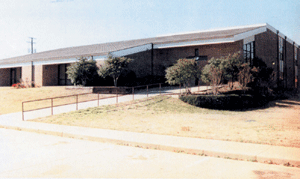 Art and music classes for little kids, with parents homeschooling most of the other subjects. Science, history, and more for middlers, each subject designed for a specific amount of parental supervision and/or teaching at home. A college prep high-school program, complete with sports and band, with parents and children still free to homeschool any subjects they choose.
Art and music classes for little kids, with parents homeschooling most of the other subjects. Science, history, and more for middlers, each subject designed for a specific amount of parental supervision and/or teaching at home. A college prep high-school program, complete with sports and band, with parents and children still free to homeschool any subjects they choose.
If this sounds like the best-case deal you could work with your local Christian or private school, think again. Because University Model Schools (UMS) are far more than another private school offering homeschoolers access to some of its courses.
Take a look at Grace Preparatory Academy in Arlington, Texas. The school that invented the UMS approach, Grace Prep's graduating class of 2001 proves there is indeed some proof in their pudding. Of the 45 graduates, three were National Merit Finalists and 70 percent earned college scholarships. The Class of 2001 calculus class earned second place in the Association of Christian Schools International math competition, and the Grace Prep basketball team were champions in the 3A division of the Texas Association of Private and Parochial Schools. All at about half the price of "regular" private school.
More than this, unlike most high-school graduates who find the transition to college life challenging, or even traumatic, Grace Prep graduates report that for them, college is "just like high school, only easier."
What is University Model Schooling?

|
|
University Model Schools spokesperson Barbara van Wart at a Washington briefing on educational reform
|
Grace Preparatory Academy opened its doors in 1993, to an entering class of 183 students. Now, in 2001, they have just under 600 students, and a large waiting list. Seven more UMS schools are now operating: five in Texas (Denton, Lucas, Marble Falls, Waxahachie, and Wylie), one in Charlotte, NC, and one in Gainesville, GA. Each of the sister schools was founded by families whose children had attended another UMS, and then found they had to move out of the area. At present, six more schools are in the works.
Parents are involved every step of the way in a UMS. And we're talking a lot more than checking to see that homework is done and baking a cake for the bake sale. Every course requires a specific degree of parental participation, which is carefully spelled out in its catalog description, and on days that the children don't have school classes, the parents are expected to be teaching them at home.
The UMS Schedule
The UMS schedule is also unique. Just like college, it's set up so courses either run on Tuesday and Thursday or Mon-Wed-Fri. Typically, classes for younger children are T-Th only. Also, just as in college, high-school students complete most of their work at home. Having become used to the discipline of organizing a study schedule, UMS students find college life a breeze. Too, the scheduling of two different classes for the same classroom, since they use it on alternate days, also results in lowered facility and faculty costs. Finally, students sign up for individual courses, rather than entire grade levels - just as in college. So it's possible to take a 10th grade English course and a 12th grade Math course in the same year, providing some of the academic freedom homeschoolers have always enjoyed.
Here's how it usually works. A younger child (grades 1 and 2) might have an enrichment class or two, while Mom and Dad teach the basics at home. As the child gets older, they might start taking some of the more time-consuming core subjects - e.g., literature and science - at school. To make the most of the classroom teaching time, parents do the drill work (spelling words, etc.), leaving the teacher free to engage young minds. By high school, usually the student is taking most courses at the school, while parents continue to supervise the assignments, which are researched and completed at home.

|
|
Grace Preparatory Academy
|
At all stages, the family chooses exactly which courses they want to take at the school and which to teach at home. Thanks to the amount of teaching the parents do, costs are kept much lower than at a typical private school.
The "Three Legs": Academics, Character, Activities
Proponents of UMS are quick to point out that it stands on three "legs." The academic program is only one of these legs. The character development program and student activities program make up the other two legs.
Obviously, children need a strong work ethic in order to succeed at an academic program which expects them to complete a good deal of work at home. So it's probably not an accident that all UMS schools to date are Christian schools, free to tell their students that God Himself expects certain attitudes and behaviors.
The UMS character curriculum is woven through the curriculum, especially the history classes and the sports/phys ed program. Parents receive a sheet of activities pertaining to that month's character trait, which is reinforced and drilled at school.
Barbara van Wart, who with her husband was one of the eight founding families, is now the chair of the GPA Ministries Outreach, graciously answered my many questions about this unique approach to education. Discussing the UMS approach to character education, Barbara pointed out that seventy percent of churches have a membership of 100 or less. So Christian parents often have little opportunity to hear major Christian speakers who deal with children's issues. Grace Prep has been able to bring in such speakers and invite the parents to listen. They also have classes once a semester just for parents. Their most recent parent class, for example, was on helping your children sustain sound relationships with those in authority. Another class featured advice on how to help your children be good friends to others and make wise choices of friends.
The activities program is another UMS strength. "We try to offer something that everybody can plug into," says Barbara van Wart. "It may be Student Council; it may be athletics; it may be the band or the Praise & Worship Team . . . so that every student has a social glue that their parents can help support them in and that they can pursue friendships through. Again, this is just what they'll be doing at college, where you find friends through your preferred activities."
Grace Prep's sports now include volleyball, football, baseball, basketball, golf, track & field, cross-country and for girls, basketball and fastpitch softball.
Mrs. van Wart points out that, while most of their scholarship graduates received academic scholarships, a goodly number of scholarship recipients got them as sports or Christian character scholarships. Also, because of the UMS schedule, students are able to continue pursuing activities they may have followed when they were just homeschooling, or that they always wanted to do but couldn't because the parents' time was totally taken up with homeschooling.
Finally, the amount of teacher-to-parent communication in a UMS is far greater than in a typical private or Christian school. "We made a mistake in getting a low-end copier at first," laughed Mrs. van Wart. "We send home a lot of paper. Students don't take down assignments off the blackboard, like in a traditional school. Every teacher for every class sends home an informational sheet that says what went on that day, what the student needs to do at home, and what they need to bring back for their next school day. It's very clear to the parents exactly what's expected. Our copier wore out the first month! Now we have a super-duper copier and we produce a syllabus for each course just like a university does."
Is University Model Schooling for You?
University Model Schools are not for everyone. The strong focus on college preparation isn't necessary for students who plan to go the apprenticeship route, and those fond of unit studies will find that University Model Schools do not provide unit-study or multi-grade-level courses, since all courses are geared to a single subject area and grade level, just as in the public schools. Some parents prefer to do all the homeschooling themselves, and others are quite comfortable relying for more complicated or Advanced Placement subjects on correspondence schools (such as Calvert School, Home Study International, and the University of Nebraska-Lincoln's Independent Study High School) and/or online academies (such as apexlearing.com, islas.org, and pahomeschoolers.com). Those who already have a full load of extracurricular activities, will not be especially enticed by a school activities program, and those families that consciously stress a strong faith and work ethic may not feel the need for outside support in this area, other than that they already get from their church.
However, for homeschool families that feel overwhelmed from time to time (see this issue's Letters column, for example!), or that wish to offer courses they are not prepared to teach, or that thrill to the idea of a well-organized social and academic outlet that is controlled by fellow homeschoolers, or who are looking for some serious help in completing high school and preparing for college, UMS could be the answer.
How to Get Started
The folks at Grace Preparatory Academy recommend the following steps.
- Read Character Driven College Preparation by Dr. John William Turner, Jr. Mrs. van Wart says that the vast majority of questions they get from callers who want to know about UMS are answered in this book, and it will save both you and them lots of time if you read it first. You can order this brand-new book for $12.95 plus $4 shipping from the book's publishers, Magnolia Publishing, at 1-800-856-8060, extension 128.
- Allow an 18-month lead time, to find the founding families, assign tasks, do research and marketing, locate a facility, hire faculty, etc.
- Check with HSLDA to see how the laws in your state handle homeschoolers whose children attend private schools, and private schools which allow students to take courses at home under parental supervision. Your enterprise may affect the legal status of the families, who may not be considered homeschoolers if their children attend more than a certain percentage of out-of-the-home classes, and you also need to be aware of the legal regulations pertaining to private schools in your state.
- You need a core group of about two to four families - a small enough number to make quick decisions without getting embroiled in committees. Two people from this group or more should plan to attend the annual Grace Preparatory Academy workshop on how to start a University Model School. The coming workshop is July 19, 2002, and costs $49 per attendee. An information packet and CD with the same facts and forms you would receive at the workshop is now available for $75, for those who are unable to make it to Arlington, Texas, in July or who don't want to wait to get started. Go to www.universitymodelschool.org to sign up for the workshop or to order the packet. You might also want to subscribe to the Grace Prep monthly newsletter, which covers trends in UMS and helps for those starting UMS schools. Suggested donation is $25, and the address is GPA Ministries, PO Box 60154, Ft Worth, TX 76115.
- A large church that doesn't use its buildings during the week makes an ideal school location. It should have a large, open front office you can use, so parents can have a welcoming place to pick up assignments, ask questions, etc.
- Be aware that enrollment might double your second semester, so don't underestimate your facility needs. Mrs. van Wart says a lot of families send a "scout child" to take just one or two courses to see how it works out. If they are happy with the results, you may end up with five more children from that family enrolled the second semester!
So, who needs government-run charter schools when we can have sports, Christian character training, academics, college scholarships and still homeschool? Bring it on, UMS!